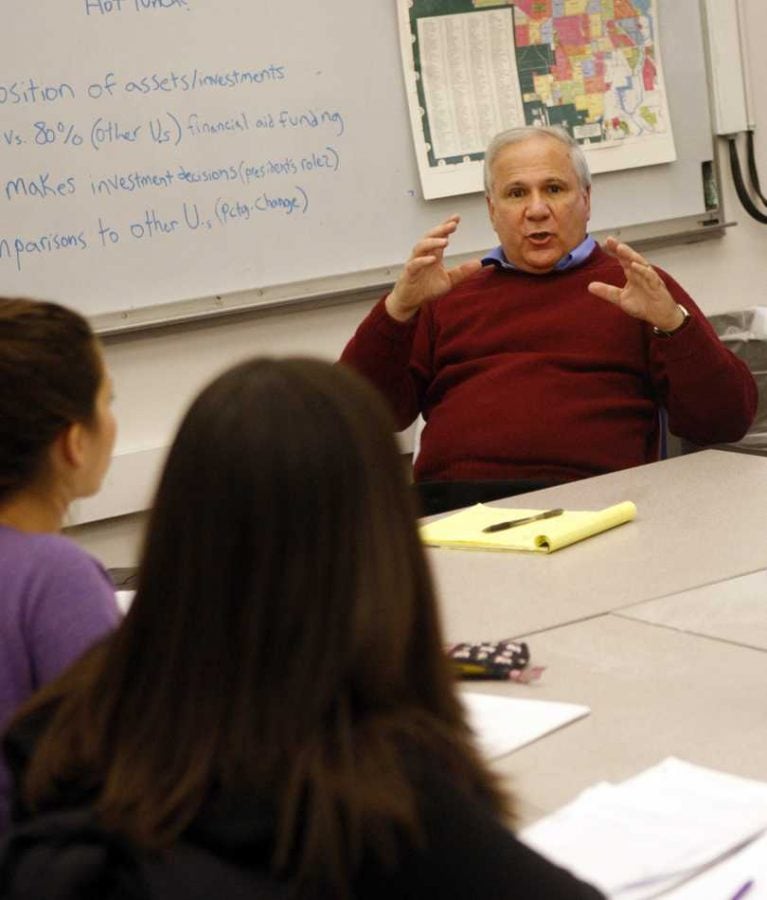Wrongful conviction lawsuit against NU, former Medill Prof. David Protess reaches settlement
Source: Brian Cassella/Chicago Tribune/TNS
Former Medill Prof. David Protess speaks with students during an Innocence Project meeting at Northwestern in 2009. A settlement was reached Friday in a 2015 lawsuit filed by Alstory Simon against Protess and Northwestern, among other defendants.
June 4, 2018
A settlement was reached Friday in the 2015 lawsuit of Alstory Simon — a former inmate whose conviction was overturned in 2014 — against Northwestern and former Medill Prof. David Protess, among other defendants.
The $40 million suit alleged that NU and Protess, along with Simon’s then-attorney Jack Rimland and private investigator Paul Ciolino, worked to frame Simon for a 1982 double homicide. The settlement still needs to be approved by a judge, according to the Chicago Tribune.
“Mr. Protess is pleased that the lawsuit filed by Alstory Simon is now over,” Matt Piers, Protess’ attorney, said in a statement. “Mr. Protess has always denied the allegations in the suit, and nothing in the settlement changes the fact that Mr. Protess vigorously denies liability or any wrongdoing.”
Terry Ekl, Simon’s attorney, could not be reached for comment on Monday. Ekl told the Tribune in a statement that a “confidentiality clause prevents the parties from commenting on the terms of the settlement.”
In a statement, University spokesman Al Cubbage said that under the terms of the settlement, NU does not admit to any wrongdoing on its part.
Simon spent more than 15 years behind bars for the murders of Jerry Hillard and Marilyn Green after the case was investigated by the Medill Innocence Project, which Protess founded to look into wrongful conviction claims. The course is now known as the Medill Justice Project.
Another man, Anthony Porter, initially was found guilty of the crime and sentenced to death. However, Porter was released from prison in 1999 after the Innocence Project’s efforts. Ciolino, the investigator who worked with the Innocence Project, obtained a video of Simon confessing to the homicides; after pleading guilty, Simon was sentenced to 37 years in prison.
The case garnered widespread attention and was initially lauded as a landmark moment: It was cited as a major factor in then-Gov. George Ryan’s decision to halt executions, which paved the way for the end of the death penalty in Illinois.
Protess retired from the University in 2011 amid accusations from NU that he doctored emails and concealed documents from prosecutors. The prosecutors had accused Protess and his students of ethical misconduct in the murder conviction investigation of Anthony McKinney.
In October 2014, Simon’s conviction was overturned after Anita Alvarez, the Cook County state’s attorney at the time, raised questions regarding the integrity of the Innocence Project’s investigation.
“This investigation by David Protess and his team involved a series of alarming tactics that were not only coercive and absolutely unacceptable by law enforcement standards,” Alvarez said at a news conference after the conviction was vacated. “They were potentially in violation of Mr. Simon’s constitutionally protected rights.”
The following February, Simon filed the suit against NU, Protess, Ciolino and Rimland, seeking $40 million as redress for the time he spent in prison. The lawsuit alleged Simon was coerced to falsely plead guilty to the murders when presented with fabricated evidence and “terrifying” threats.
Ciolino has also filed two lawsuits against Simon, his lawyers and other parties. The first, a $25 million defamation countersuit, was filed in April 2016 but dismissed in January 2017 when a federal judge decided it was too unrelated to the original complaint for the court to exercise jurisdiction.
The second, filed in January 2018, alleges that nine defendants conspired to undermine the Innocence Project investigation. This suit is still pending in Cook County Circuit Court, said Jennifer Bonjean, Ciolino’s attorney.
On Monday, Bonjean told The Daily she is disappointed in Northwestern and believes the University had an obligation to determine the truth in the case.
“There was no guilt associated with it, or responsibility accepted, culpability accepted — I get that,” she said. “But the average person in the world doesn’t make those distinctions. They read in the newspaper, they see a settlement, they see that as some type of acquiescence.”
Alan Perez contributed reporting.
Email: [email protected]
Twitter: @madsburk
Email: [email protected]
Twitter: @peterkotecki


